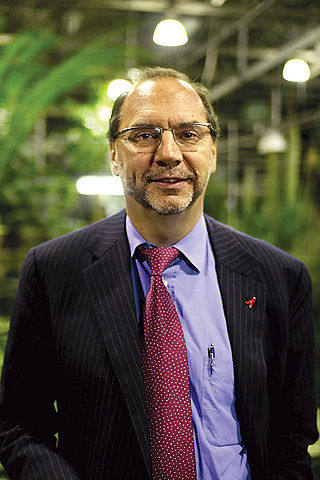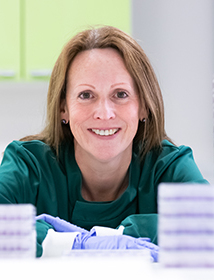Related Research Articles

David Baltimore is an American biologist, university administrator, and 1975 Nobel laureate in Physiology or Medicine. He is a professor of biology at the California Institute of Technology (Caltech), where he served as president from 1997 to 2006. He founded the Whitehead Institute and directed it from 1982 to 1990. In 2008, he served as president of the American Association for the Advancement of Science.

Sir Peter Karel, Baron Piot, is a Belgian-British microbiologist known for his research into Ebola and AIDS.

Howard Martin Temin was an American geneticist and virologist. He discovered reverse transcriptase in the 1970s at the University of Wisconsin–Madison, for which he shared the 1975 Nobel Prize in Physiology or Medicine with Renato Dulbecco and David Baltimore.

Stanley Alan Plotkin is an American physician who works as a consultant to vaccine manufacturers, such as Sanofi Pasteur, as well as biotechnology firms, non-profits and governments. In the 1960s, he played a pivotal role in discovery of a vaccine against rubella virus while working at Wistar Institute in Philadelphia. Plotkin was a member of Wistar’s active research faculty from 1960 to 1991. Today, in addition to his emeritus appointment at Wistar, he is emeritus professor of Pediatrics at the University of Pennsylvania. His book, Vaccines, is the standard reference on the subject. He is an editor with Clinical and Vaccine Immunology, which is published by the American Society for Microbiology in Washington, D.C.

Sir David Charles Baulcombe is a British plant scientist and geneticist. As of 2017 he is a Royal Society Research Professor. From 2007 to 2020 he was Regius Professor of Botany in the Department of Plant Sciences at the University of Cambridge.
Geoffrey Lilley Smith FRS FMedSci FRSB is a British virologist and medical research authority in the area of Vaccinia virus and the family of Poxviruses. Since 1 October 2011 he is head of the Department of Pathology at the University of Cambridge and a principal research fellow of the Wellcome Trust. Before that, he was head of the Department of Virology at Imperial College London.

Karl Maramorosch was an Austrian-born American virologist, entomologist, and plant pathologist. A centenarian and polyglot, he conducted research on viruses, mycoplasmas, rickettsiae, and other micro-organisms; and their transmission to plants through insect vectors in many parts of the world. He is the co-author of a textbook on techniques in virology and is the author of numerous papers on the biology and ecology of plant viruses, their hosts, and vectors. He received the Wolf Prize in Agriculture in 1980 for his contribution to the study of crop pathogens.
Thumbi Ndung’u is a Kenyan-born HIV/AIDS researcher. He is the deputy director (Science) and a Max Planck Research Group Leader at the Africa Health Research Institute (AHRI) in Durban, South Africa. He is Professor of Infectious Diseases in the Division of Immunity and Infection, University College London. He is Professor and Victor Daitz Chair in HIV/TB Research and Scientific Director of the HIV Pathogenesis Programme (HPP) at the Nelson R. Mandela School of Medicine, University of KwaZulu-Natal. He holds the South African Research Chair in Systems Biology of HIV/AIDS. He is an Adjunct Professor of Immunology and Infectious Diseases at the Harvard T.H. Chan School of Public Health. He is the Programme Director of the Sub-Saharan African Network for TB/HIV Research Excellence (SANTHE), a research and capacity building initiative funded by the African Academy of Sciences and the Wellcome Trust.
Peter K. Vogt is an American molecular biologist, virologist and geneticist. His research focuses on retroviruses and viral and cellular oncogenes.
Jane A. McKeating is a professor of molecular biology at Oxford University, and honorary professor at the University of Birmingham, England, where she worked as a professor of molecular virology until 2017. She is listed as a notable scientist in Thomson Reuters' Highly Cited Researchers 2014, ranking her among the top 1% most cited scientists.

Wendy Sue Fox is a British virologist. She is currently head of Department of Infectious Disease and chair in Influenza Virology at Imperial College London. She leads a team of scientists studying the influenza virus and its physiology and morphology to discover novel vaccines. In particular, they are trying to understand more about influenza virus mutations, and how they can allow scientists to create new vaccines against possible flu pandemics.

Roberto Burioni is an Italian virologist, physician, and academic. A Professor of Microbiology and Virology at the Vita-Salute San Raffaele University, he runs there a lab developing human monoclonal antibodies against human infectious agents, the study of pathogen-host interplay, and the use of molecular tools in the early diagnosis of infectious diseases. A prominent virologist, Burioni has risen to fame in Italy for his strong stance against the antivaccination movement and has been described as the "most famous virologist in Italy".

Shahid Jameel is an Indian virologist and academic. Dr. Jameel is the Sultan Qaboos bin Said Fellow at Oxford Centre for Islamic Studies and Research Fellow, Green Templeton College, University of Oxford. He serves as the Principal Investigator for the Centre's project on Public Health, Science and Technology in Muslim societies. Previously he was the director of the Trivedi School of Biosciences since its inception in the year 2020 at Ashoka University. He was formerly head of the scientific advisory group to the Indian SARS-CoV-2 Genomics Consortia (INSACOG) established in December 2020, and the chief executive officer of Wellcome Trust DBT India Alliance. Known for his research in hepatitis E virus, Jameel is an elected fellow of all the three major Indian science academies viz. National Academy of Sciences, India, Indian Academy of Sciences, and Indian National Science Academy. The Council of Scientific and Industrial Research, the apex agency of the Government of India for scientific research, awarded him the Shanti Swarup Bhatnagar Prize for Science and Technology, one of the highest Indian science awards for his contributions to Medical Sciences in 2000.
Guan Yi is a Chinese virologist. In 2014, he was ranked as 11th in the world by Thomson Reuters among global researchers in the field of microbiology. He obtained his PhD in microbiology at the University of Hong Kong and is now a professor of microbiology at his alma mater. His research on the viral respiratory disease SARS helped the Chinese government avert the 2004 outbreak of this disease. He is the current director of the State Key Laboratory for Emerging Infectious Diseases University of Hong Kong. In early 2017, Guan warned that the H7N9 influenza virus "poses the greatest threat to humanity than any other in the past 100 years".

The Wuhan Institute of Virology, Chinese Academy of Sciences is a research institute on virology administered by the Chinese Academy of Sciences (CAS), which reports to the State Council of the People's Republic of China. The institute is one of nine independent organisations in the Wuhan Branch of the CAS. Located in Jiangxia District, Wuhan, Hubei, it was founded in 1956 and opened mainland China's first biosafety level 4 (BSL-4) laboratory in 2018. The institute has collaborated with the Galveston National Laboratory in the United States, the Centre International de Recherche en Infectiologie in France, and the National Microbiology Laboratory in Canada. The institute has been an active premier research center for the study of coronaviruses.

Dame Sarah Catherine Gilbert FRS is an English vaccinologist who is a Professor of Vaccinology at the University of Oxford and co-founder of Vaccitech. She specialises in the development of vaccines against influenza and emerging viral pathogens. She led the development and testing of the universal flu vaccine, which underwent clinical trials in 2011.

Sir Jonathan Stafford Nguyen Van-Tam is a British physician specialising in influenza, including its epidemiology, transmission, vaccinology, antiviral drugs and pandemic preparedness.
Andrew Rambaut is a British evolutionary biologist, as of 2020 professor of molecular evolution at the University of Edinburgh.
Michael J. Tildesley is Professor in Infectious disease modelling at the University of Warwick. He is a member of the Scientific Pandemic Influenza Modelling group (SPI-M) of SAGE.
Leondios G. Kostrikis is a molecular virologist from Cyprus and a professor of molecular virology at the University of Cyprus. He is a founding member of the Cyprus Academy of Sciences, Letters and Arts and a member of Academia Europaea. In 2022, he attracted media attention with the news of having found a "Deltacron" Coronavirus variant, a recombinant between Delta and Omicron strains. The emergence of this phenomenon initially evoked scepticism, characterized by concerns primarily centered around contamination or coinfection as plausible etiological contributors. These hypotheses were predominantly disseminated through unsubstantiated assertions within the realms of social and mass media, lacking concurrent scientific evidence to validate their claims. Comparable observations on a global scale dispelled doubt, eventually leading to the recognition of Delta-Omicron variants by the scientific community and their subsequent monitoring by the World Health Organization.
References
- ↑ "Professor Jonathan Ball - the University of Nottingham".
- ↑ University of Nottingham
- ↑ "University Challenge: Warwick v Imperial". bbc.co.uk. 12 December 2019. Retrieved 16 April 2021.
- ↑ "BBC Radio 4 - The Life Scientific, Jonathan Ball on his arms race against viruses". BBC. Retrieved 17 February 2024.